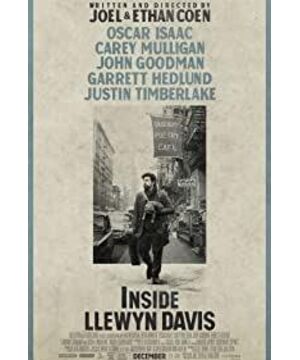"If you hear a song, it doesn't sound new, but it's not too outdated, it's a folk song."
Indeed, to say what kind of music a folk song is, it's actually hard to tell its style and origin. In the Middle Ages there were gypsy singers who performed with performance groups, and bards who recorded historical events and sang. The origins of modern and contemporary American folk songs are said to be from the farming people in the Appalachian Mountains. But for hundreds of years no one could deny the intoxicating charm of ballads. Because he still touches people's hearts with his old and retro feelings. In fact, he has survived to this day, and he should be more grateful to the musicians who have worked tirelessly on this road. Probably Drunk Town Ballad is such a story about the evolutionary history of folk ballads. This new work by the Coen brothers at the end of 2013 is also the best movie I have seen recently. It is also a story about a loser. Personal preference for ballads, talk about the superficial understanding of this movie. There are large spoilers in the article, students who have not read it hope to understand.
Inside Llewyn Davis, based on the personal experience of the Coen brothers and the folk singer Dave van Juncker, tells the story of a frustrated folk singer in the 1960s and 1970s. At that time, this dear friend inherited the era of the revival of folk songs. Since then, Bob Dylan, Neil Young, etc., who have come out, accompanied American folk songs to lead the cultural trend that changed an era. However, these have nothing to do with the tone of the film. In fact, as directors who are very good at portraying the embarrassing state of small characters and dramatic plots, this time the Coen brothers have taken up their highly symbolic expression methods, aiming at delicate Delicately portrays such a Luther who cares about one thing and loses another on the road of life. And this brings a scene inadvertently passed by in the history of the legendary folk ballad. The title of the film is probably the finishing touch of a person who loves music. The character is taken from the real experience written in the autobiography of folk singer Dave van Juncker. Dave was a pioneer of the folk revival in the 1960s. Passing his flagpole were several eloquent figures—Bob Dylan. But he himself can only be regarded as a loser.
David in the movie is such a loser who has been running around on the ballad road. He has released an album, which is the title (Inside Llewyn Davis), Hangout is a very nice and heartfelt track, most of which symbolize his inner heart. Appeals, but no record company is willing to pay for his records. As a singer, David pursues performance opportunities to obtain accommodation and money. Unfortunately, in New York, where money is high, not many people are willing to appreciate his talent. Despite his talents, David was a stinky, self-righteous, and irresponsible person. He slept with his friend's wife, let his ex-girlfriend and friend's wife have abortions one after another, looked down on other singers, and scolded the performers at the performance bar and was beaten. The whole time from the beginning of failure to the end of failure, depressed and sad. In the movie, unlike the previous ups and downs of the Coen brothers, which were icy and bloodless, they began to give up some dark humor, and replaced them with more extensions and symbols, using search, road, and running as clues throughout the construction of the film. The whole chapter is only accompanied by a generation of embarrassment and frustration. This somewhat symbolizes the ups and downs of the folk song road. From the beating plot at the beginning to the end, David is connected, forming an endless cycle of running around for life and being confused and helpless.
The two most important clues in the movie are looking for the cat and the road to Chicago. The cat was taken out of the house by David while he was staying at the professor's house. Without a key, David was helpless and traveled around the city with his luggage and backpack alone. And a lot of the time, the Coen brothers are telling the story from the cat's point of view, about the man David. In one episode, when David walked through the New York subway tunnel with the cat in his arms, the flashing platform and neon passed by the cat, which seemed to be the living world in David's eyes. What's more peculiar is that the cat's name is Ulysses, which is also a tragic hero in Greek mythology who is looking for his way home.
Jim's girlfriend was still complaining about the pain, and David stared frustratedly at the avenue outside the floor-to-ceiling window. Suddenly he found something, got up to say goodbye to her, ran out of the lounge door, and quickly grabbed the cat in the crowd, "Finally, I caught you."
After the cat is lost, the process of finding the cat becomes a theme throughout the film. And David describes most of the time as a process of finding the cat. Folk music in the historical context has experienced a weak recovery after the suppression of McCarthyism in the 1950s (most folk musicians were even the Communist Party at that time). However, people had a grudge against the indulgence and decadence advocated during the Cold War (the Beat Generation during the Ginsburg period in the 1960s), and traditional music seemed to be able to hit people's hearts more directly. Therefore, folk songs also developed into a symbolic sustenance at that time. More Represents the return to the self. The plot of looking for a cat here has become an intention in David's heart, not only yearning for approval (the professor symbolizes the approval of the public), but also carrying the inner burden of being afraid of being lost and being afraid of wandering. It symbolizes that after the suppression of folk music in the 1950s, it is in urgent need of recovery, but the development path is equally bumpy, and the fear of getting lost is also a typical depression of a generation.
Another clue is David's trip to Chicago with the fat man. The driver is also a performance singer (psychedelic punk?), the old man is a jazz musician, all of them are a group of frustrated losers, embarking on a journey to find themselves and return home. Returning home is an important theme in folk music, and these characters in the car represent a form that deviates from mainstream values to some extent. decadent and dying classical), and the folk singer David, who is also struggling on the edge. In an era of commodity excess that is almost themed on material desires and brands, David and his party's road to success and return is also full of thorns. And David, who had a bad nose in Chicago, listened to his mother's suggestion to give up the folk songs and become a sailor, but was cheated by the first mate and left in high spirits. At the end of the film, in a blink of an eye, we return to the night of David's performance in Greenwich Village, which turns out to be a flashback technique. It seems that David's ballad road has turned a corner. It was only after talking with the boss that he found out that it was actually a performance opportunity exchanged by his girlfriend through a relationship with the bar owner. David, who couldn't bear the anger, had to lose his temper on the female singer who performed next. On the body, in exchange for the ending - it is also a retaliatory beating. At this point, it seems that Sisyphus repeatedly pushed the stone up the mountain, and the stone rolled down again and again.
Take a closer look, there are many tributes to the pioneers of folk songs in the film. The "five hundred miles" performed by the jim couple is also a folk song for returning home, while David's hang me, oh hang me is a folk song Political music that often comes with it. At the end, the hoarse voice of the young man singing farewell in the Gaslight Bar caught David's attention. Familiar people know that this is Bob Dylan's Farewell, and the guy who set off to transfer to David is naturally the legendary folk poet - Bob Dylan.
PS Last year, I made a special trip to Changsha to listen to Li Zhi's concert. At that time, when I saw the scene of the crowd singing "With You", I was really surprised by the changes over the years. The former bitter master of folk songs forced his brother to come out with a song "Memories of Zhengzhou" when he spent his time in the Zhengzhou Internet Cafe, but now he can compose the harmony of the band and even the cool guitar solo. Although the forced brother on the stage still has a decadent personality, he seems to bring the color of the successful transformation of commercial performances. In any case, this is a gratifying thing. When I saw the rock-and-roll version of "With You" on stage, I suddenly remembered the historic scene when Dylan plugged in the electric guitar and performed. History is so similar over and over again?
View more about Inside Llewyn Davis reviews











